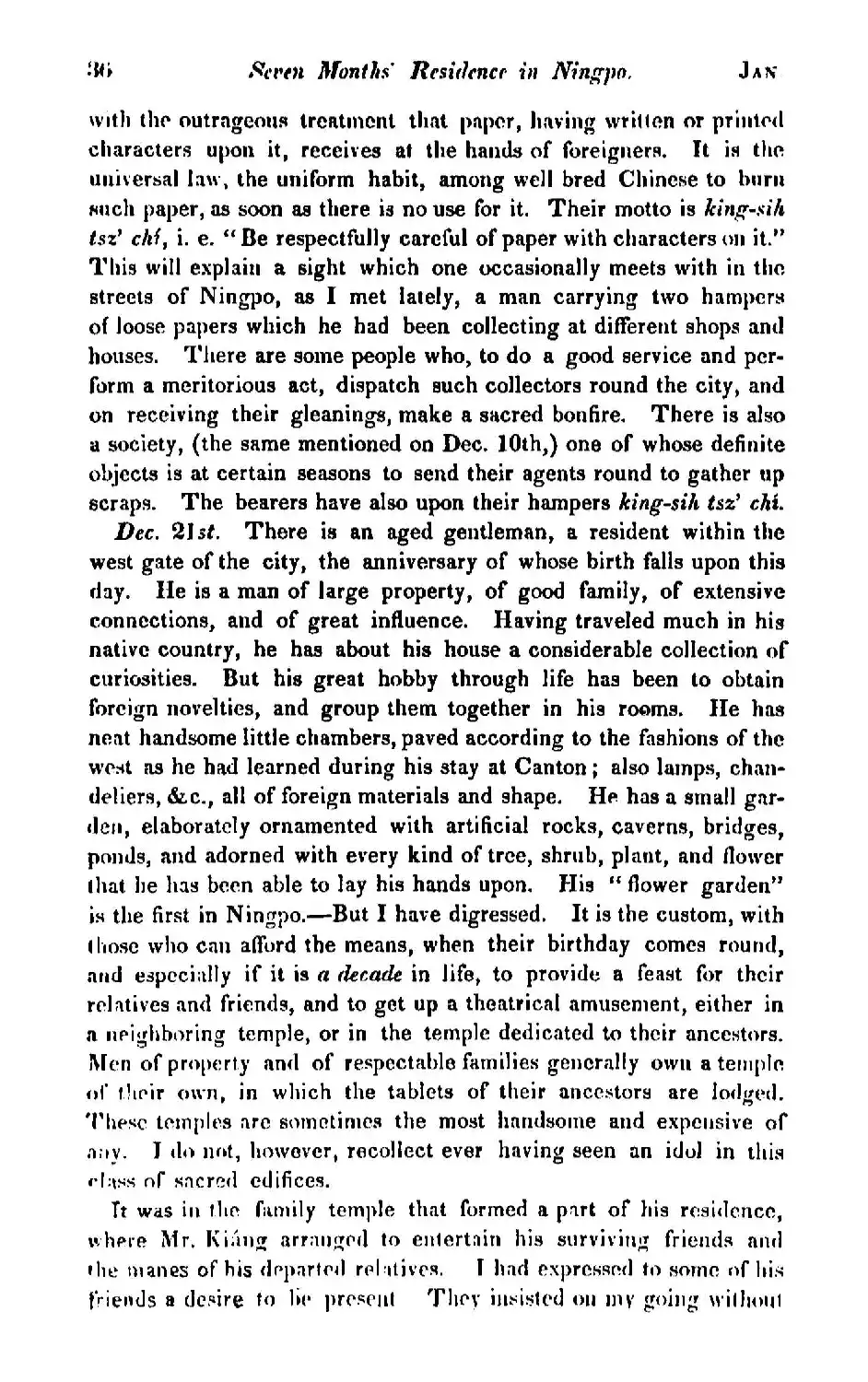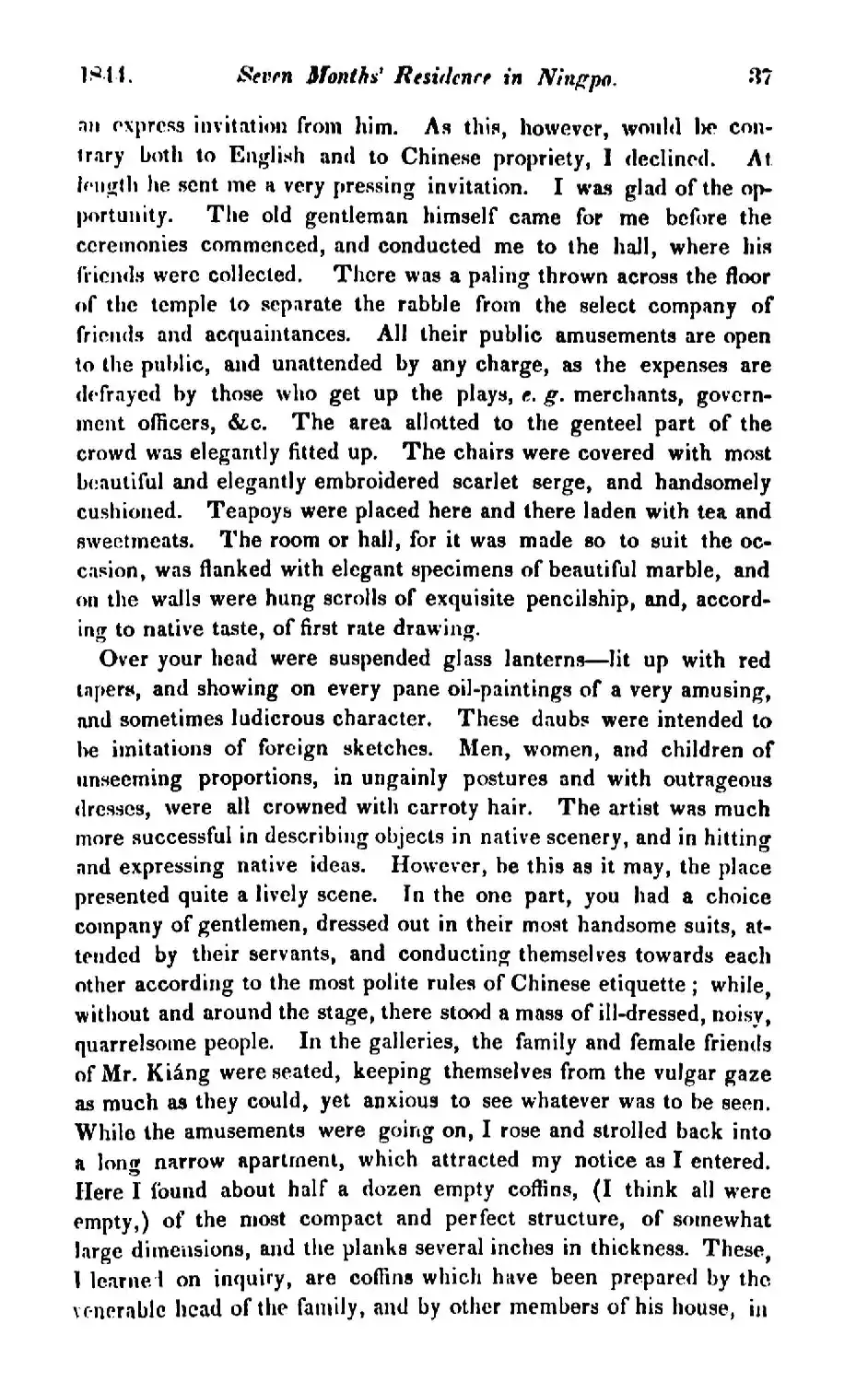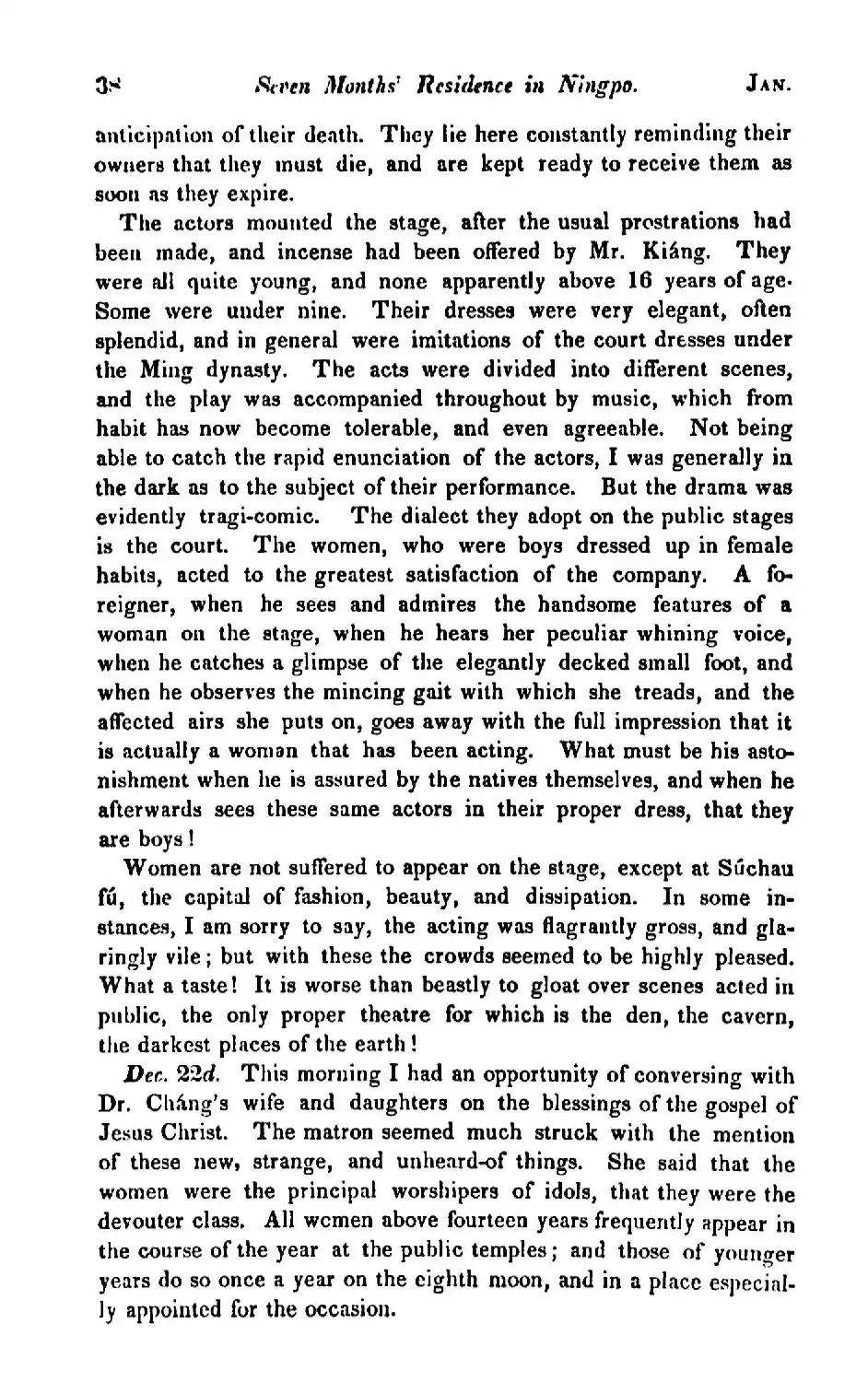The Chinese Repository, Volume 13 (January 1844)
- Info
- Pages
- Transcript
- Related
Dec. 21st. There is an aged gentleman, a resident within the west gate
of the city, the anniversary of whose birth falls upon this day. He is a
man of large property, of good family, of extensive connections, and of
great influence. Having traveled much in his native country, he has
about his house a considerable collection of curiosities. But his great
hobby through life has been to obtain foreign novelties, and group them
together in his rooms. He has neat handsome little chambers, paved
according to the fashions of the west as he had learned during his stay
at Canton; also lamps, chandeliers, &c., all of foreign materials and
shape. He has a small garden, elaborately ornamented with artificial
rocks, caverns, bridges, ponds, and adorned with every kind of tree,
shrub, plant, and flower that he has been able to lay his hands upon.
His “flower garden” is the first in Ningpo,—But I have digressed. It is
the custom, with those who can afford the means, when their birthday
comes round, and especially if it is a decade in life, to provide a
feast for their relatives and friends, and to get up a theatrical
amusement, either in a neighboring temple, or in the temple dedicated to
their ancestors. Men of property and of respectable families generally
own a temple of their own, in which the tablets of their ancestors are
lodged. These temples are sometimes the most handsome and expensive of
any. I do not, however, recollect over having seen an idol in this class
of sacred edifices.
It was in the family temple that formed a part of his residence, where
Mr. Kiáng arranged to entertain his surviving friends and the manes of
his departed relatives. I had expressed to some of his friends a desire
to be present. They insisted on my going without express invitation from
him. As this, however, would be contrary both to English and to Chinese
propriety, I declined. At length he sent me a very pressing invitation,
I was glad of the opportunity. The old gentleman himself came for me
before the ceremonies commenced, and conducted me to the hall, where his
friends were collected. There was a paling thrown across the floor of
the temple to separate the rabble from the select company of friends and
acquaintances. All their public amusements are open to the public, and
unattended by any charge, as the expenses are defrayed by those who get
up the plays, e.g. merchants, government officers, &c. The area allotted
to the genteel part of the crowd was elegantly fitted up. The chairs
were covered with most beautiful and elegantly embroidered scarlet
serge, and handsomely cushioned. Teapoys were placed here and there
laden with tea and sweetmeats. The room or hall, for it was made so to
suit the occasion, was flanked with elegant specimens of beautiful
marble, and on the walls were hung scrolls of exquisite pencilship, and,
according to native taste, of first rate drawing.
Over your head were suspended glass lanterns—lit up with red tapers, and
showing on every pane oil-paintings of a very amusing, and sometimes
ludicrous character. These daubs were intended to be imitations of
foreign sketches. Men, women, and children of unseeming proportions, in
ungainly postures and with outrageous dresses, were all crowned with
carroty hair. The artist was much more successful in describing objects
in native scenery, and in hitting and expressing native ideas. However,
be this as it may, the place presented quite a lively scene. In the one
part, you had a choice company of gentlemen, dressed out in their most
handsome suits, attended by their servants, and conducting themselves
towards each other according to the most polite rules of Chinese
etiquette; while, without and around the stage, there stood a mass of
ill-dressed, noisy, quarrelsome people. In the galleries, the family and
female friends of Mr. Kiáng were seated, keeping themselves from the
vulgar gaze as much as they could, yet anxious to see whatever was to be
seen. While the amusements were going on, I rose and strolled back into
a long narrow apartment, which attracted my notice as I entered. Here I
found about half a dozen empty coffins, (I think all were empty,) of the
most compact and perfect structure, of somewhat large dimensions, and
the planks several inches in thickness. These, I learned on inquiry, are
coffins which have been prepared by the venerable head of the family,
and by other members of his house, in anticipation of their death. They
lie here constantly reminding their owners that they must die, and are
kept ready to receive them as soon as they expire.
The actors mounted the stage, after the usual prostrations had been
made, and incense had been offered by Mr. Kiáng. They were all quite
young, and none apparently above 16 years of age. Some were under nine.
Their dresses were very elegant, often splendid, and in general were
imitations of the court dresses under the Ming dynasty. The acts were
divided into different scenes, and the play was accompanied throughout
by music, which from habit has now become tolerable, and even agreeable.
Not being able to catch the rapid enunciation of the actors, I was
generally in the dark as to the subject of their performance. But the
drama was evidently tragi-comic. The dialect they adopt on the public
stages is the court. The women, who were boys dressed up in female
habits, acted to the greatest satisfaction of the company. A foreigner,
when he sees and admires the handsome features of a woman on the stage,
when he hears her peculiar whining voice, when he catches a glimpse of
the elegantly decked small foot, and when he observes the mincing gait
with which she treads, and the affected airs she puts on, goes away with
the full impression that it is actually a woman that has been acting.
What must be his astonishment when he is assured by the natives
themselves, and when he afterwards sees these same actors in their
proper dress, that they are boys!
Women are not suffered to appear on the stage, except at Súchau fú, the
capital of fashion, beauty, and dissipation. In some instances, I am
sorry to say, the acting was flagrantly gross, and glaringly vile; but
with these the crowds seemed to be highly pleased. What a taste! It is
worse than beastly to gloat over scenes acted in public, the only proper
theatre for which is the den, the cavern, the darkest places of the
earth!


